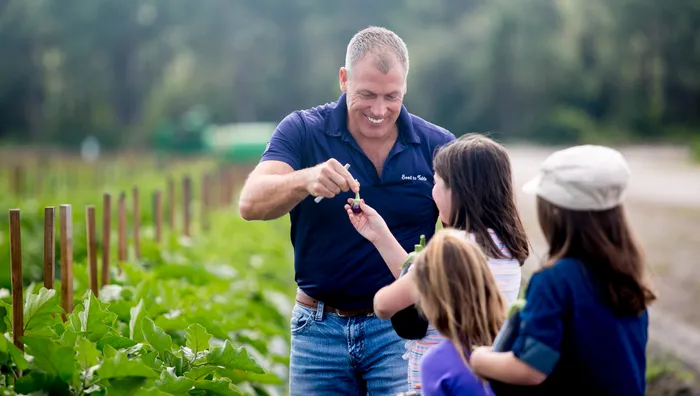Alfie Oakes is not your typical businessman. As the founder of Oakes Farms, Oakes Farms Market, and a number of other ventures, he has built a successful, sustainable empire rooted in a deeply personal business philosophy that challenges conventional wisdom. His approach to business is driven by a unique blend of entrepreneurial spirit, a commitment to sustainability, and a firm belief in community empowerment. In this article, we’ll take a deep dive into the strategies that define Oakes’ business philosophy, revealing how he has turned his vision into a thriving operation.
A Commitment to Sustainability and Regenerative Agriculture
One of the core pillars of Alfie Oakes’ business philosophy is sustainability. Unlike many large-scale agribusinesses that rely on industrial farming techniques, Oakes has built his empire on regenerative agriculture—a set of practices designed to restore soil health, increase biodiversity, and reduce the environmental impact of farming.
Oakes believes that true success in farming and business is not just about maximizing profits, but also about ensuring that the land remains fertile and viable for future generations. Practices like crop rotation, composting, and minimal pesticide use are central to his farming operations. These methods not only benefit the environment but also help to improve the quality and nutritional value of the food grown on his farm.
This commitment to sustainability also extends beyond farming into Oakes’ broader business practices. He runs Oakes Farms Market with a focus on local, organic, and sustainably grown food. His customers are not just buying produce—they’re supporting a business model that values environmental stewardship and long-term ecological health over short-term gains.
For Oakes, sustainability isn’t just a buzzword. It’s an essential business strategy that aligns with his long-term vision for agriculture. By focusing on regenerative practices, he’s creating a business that isn’t just profitable today, but also viable and resilient in the future.
A Direct-to-Consumer Model
Oakes is known for his ability to bypass the middleman and go directly to the consumer. This direct-to-consumer business model has been a game-changer for his operations, particularly at Oakes Farms Market, where he offers fresh, locally grown produce, meats, and other grocery items sourced directly from his farm and other local suppliers.
By cutting out the middleman, Oakes is able to provide higher-quality food at more affordable prices for consumers. It also means that a larger portion of the profit stays within the business, which helps to ensure the sustainability of the farm itself. This model gives him greater control over the pricing and distribution of his products, allowing him to operate with more flexibility and independence compared to traditional retail grocery stores that rely on corporate supply chains.
The direct-to-consumer approach also allows Oakes to build stronger relationships with his customers. By fostering transparency about where their food comes from and how it’s grown, Oakes has built a loyal customer base that values the personal connection to their food sources. His customers know exactly who is growing their produce and have the opportunity to learn about the practices that go into making it fresh and sustainable.
Efficiency and Innovation
Alfie Oakes is known for his hands-on, entrepreneurial spirit. He’s not afraid to innovate, try new approaches, or challenge traditional business norms to achieve greater efficiency and effectiveness. From his farming operations to his market retail strategies, Oakes is constantly looking for ways to streamline his processes, reduce waste, and increase productivity.
In the world of farming, this often means integrating technology and modern systems with age-old agricultural practices. Oakes uses data-driven tools to monitor crop health, inventory, and customer preferences, ensuring that his farm and market operations run as smoothly and efficiently as possible. For instance, he employs precision agriculture methods to reduce water usage, optimize fertilizer application, and minimize labor costs, all while maintaining the quality of his products.
In addition, Oakes is constantly evolving his retail strategies to keep up with consumer trends. He has incorporated e-commerce and home delivery services to expand his market’s reach and make it easier for customers to access fresh produce without having to visit the store in person. This embrace of technology allows Oakes to stay competitive in an industry that is increasingly dependent on digital tools and platforms.
Oakes’ ability to adapt and innovate, while maintaining a strong commitment to sustainability, is a testament to his understanding of the business landscape. He knows that success isn’t just about doing things the way they’ve always been done—it’s about constantly looking for ways to improve and stay ahead of the curve.
Empowering Local Communities
One of the most distinctive aspects of Alfie Oakes’ business philosophy is his focus on empowering local communities. He believes that businesses should play an active role in their communities, and that fostering local economies is key to long-term success. This belief is reflected in his market model, where Oakes sells not only his own farm’s produce but also products from other local farmers and artisans.
By supporting local producers, Oakes helps to build a stronger, more resilient food system where money stays within the community. This approach not only benefits the local economy but also strengthens the ties between consumers and producers, creating a sense of shared purpose and mutual benefit. Oakes’ emphasis on sourcing local products creates a marketplace that is rooted in the community and provides customers with fresher, higher-quality food than they might find in larger, corporate-run grocery stores.
Moreover, Oakes is deeply involved in local agricultural advocacy. He often speaks out about the importance of food sovereignty, food security, and the need for a more decentralized food system. His push for policies that support small, independent farmers and local food systems reflects his belief that empowering local communities is not only good for business—it’s good for society as a whole.
A Strong Stance on Business Freedom and Independence
Oakes is also a strong advocate for business freedom. He believes that entrepreneurs should be able to operate without excessive government interference, especially when it comes to regulations that disproportionately affect small businesses. His outspoken views on government restrictions, particularly in the food and agriculture sectors, have earned him a reputation as a champion of business independence.
For Oakes, business freedom means that farmers and entrepreneurs should have the liberty to grow, sell, and market their products without being bogged down by overly complex rules or regulations that benefit large corporations but harm smaller operations. He’s called for less government control over food production and more freedom for small farmers to innovate, allowing them to compete with the corporate giants that dominate the industry.
This stance on business freedom also extends to his support for “food freedom”—the idea that consumers should have the right to access fresh, locally grown food without government-imposed limitations. By fighting for policies that allow consumers to purchase directly from farmers and support more open markets, Oakes is advocating for a food system that is more flexible, diverse, and decentralized.
Long-Term Vision: Building a Legacy
At the heart of Oakes’ business philosophy is a long-term vision for the future. He isn’t just focused on short-term profits—he’s building a legacy of sustainability, local empowerment, and innovation. Every decision he makes, from the farming practices he employs to the way he operates his market, is designed with the future in mind.
His focus on regenerative agriculture ensures that his farm will remain viable for future generations, while his direct-to-consumer business model helps to create a more resilient food system that isn’t reliant on the whims of large corporations or global supply chains. Oakes understands that the future of farming and business lies in creating systems that are adaptable, sustainable, and equitable.
Conclusion
Alfie Oakes’ business philosophy is built on a foundation of sustainability, community, innovation, and independence. By staying true to these principles, he has created a thriving business that is redefining what success looks like in agriculture. His commitment to regenerative farming, local food systems, and the empowerment of independent farmers is not just a strategy for growth—it’s a blueprint for a more resilient and sustainable future. In a world where big corporations often dominate the food industry, Oakes’ approach offers a refreshing alternative—one that proves that with the right strategies, small businesses and independent farmers can thrive in today’s complex and competitive marketplace.



